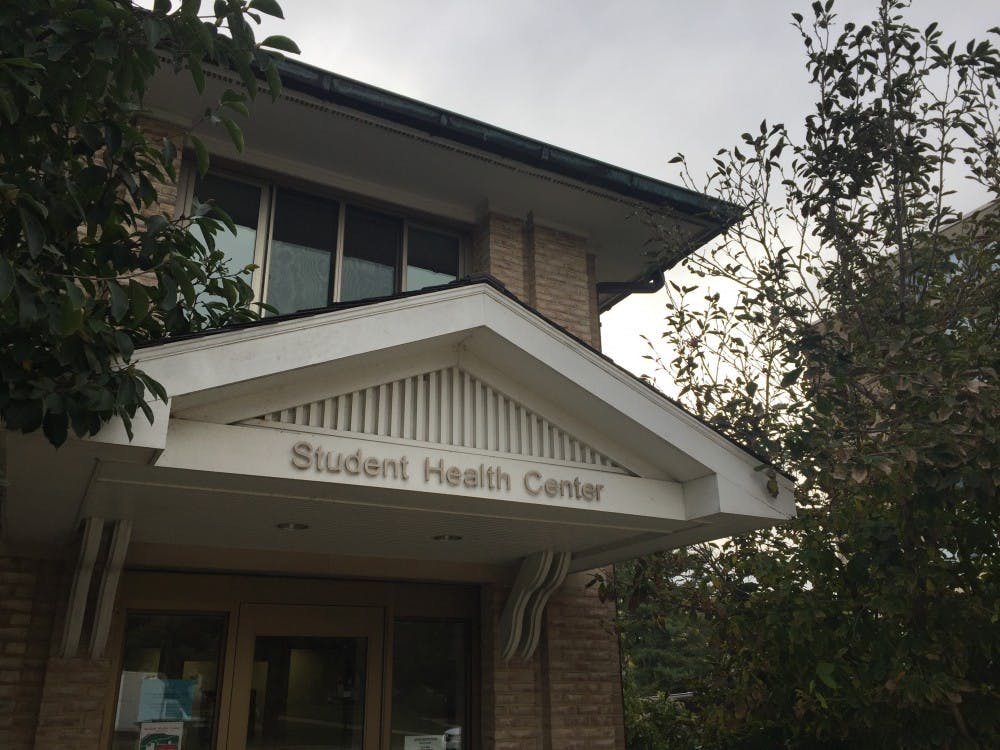Students for Reproductive Justice at American University is advocating for an emergency contraceptive vending machine to be installed in Mary Graydon Center to provide more support for students’ reproductive health.
After receiving 1,000 signatures on a petition calling for their demands, AURepro protested for emergency contraceptive access Nov. 30 on the quad.
According to Students for Change Director Kaniya Harris, SFC and AURepro recently reached out to administration officials about installing the machine on AU’s campus.
“We emailed admin on Friday and proposed the installation of EC vending machines in the Mary Graydon Center, we gave them the deadline of Feb. 26 and we asked them to stock it with Plan B and condoms,” Harris said.
AURepro started their petition this fall and began gathering hundreds of signatures from the AU community. AURepro President Lane Thimmesch, a sophomore in the School of International Service, said this initiative has been an ongoing project at AU, as well as at other institutions.
“I vividly remember reading about our friends over at GW who installed an emergency contraceptive vending machine on their campus this past spring, they now have three,” Thimmesch said. “This machine has 24/7 access for all students, only costs $10 and GW is not the only one who has this machine. There are over 45 colleges, nationwide, that have EC vending machines on their campus.”
GW is currently the only university in D.C. to have such a machine, and Harris said this “blueprint” model will make it easier for AU to implement something similar on its campus.
“We have talked to admin about this in previous years, and the answer they gave us was that they didn’t have a blueprint,” Harris said. “So when GW got theirs, we were like well there’s the blueprint.”
Although AU has emergency contraceptives at the Student Health Center, Thimmesch said accessing them is not as easy as it seems. The Student Health Center currently prices Plan B at $10 and Ella, an emergency contraceptive that is slightly more effective and has a higher weight limit than Plan B, at $30 for students on AU’s insurance plan. For students with outside insurance, they must pay the full price of the medications and seek reimbursement from their insurance companies.
“Currently, the only on-campus facility that offers EC is the Student Health Center,” Thimmesch said. “The Student Health Center does not offer walk-in appointments; you must schedule it online or over the phone.”
Thimmesch said that AURepro’s initiative to get the vending machines on campus has been an ongoing project and it is continuing to use student support to gain enough traction for the official installation of the machines.
“Having an on-campus haven for students just to know they have the care that they need, even when nationwide there’s a lot of attacks happening, is what motivated us to do this now,” Thimmesch said. “Access to these critical emergency contraceptives is really important. Although emergency contraceptives are not a replacement for abortion care, we want to make it as easy as possible for students on campus to not have to deal with a lot of reproductive health care hurdles.”
Thimmesch said the vending machine would contain condoms, menstrual products and emergency contraceptives, lowering their prices to increase accessibility for students. Thimmesch said the lower pricing and central location of these products in MGC would allow any student to easily access any of the products provided.
“The model is to provide a discreet 24/7 available option on campus for students at a lower price,” Thimmesch said. “Our goal asking price is going to be between 10 and 15 dollars. Compared to off-campus, it’s 50 or 49 dollars, so we want to build accessibility.”
The discretion part of the machine’s model will provide students with a way to avoid any anxieties around receiving emergency contraceptives, Thimmesch said.
“For people who don't want to meet face to face with somebody, it can be a much [more] discreet option to be able to go to a machine, vendor it yourself and be the only one who knows what's happening in that interaction,” Thimmesch said.
In addition to these machines, Harris said Students for Change also wants to implement a student resources center with a focus on information on abortions and emergency contraceptives for students to visit whenever needed.
“With this emergency contraceptive machine, it would be important that we also have an educational aspect,” Harris said. “We even talked about distributing educational fact sheets about STIs and things like that, things that some people do not know about because they were never taught, or because of the misconceptions that you may hear on social media.”
Harris said accessibility is not the only struggle that stands between college students and emergency contraceptives, but basic education on what these products do is also very lacking due to an overwhelming stigma surrounding the topic of sex.
“Yes, we have these condoms that are put in dorms and put in places, but those run out fast, there is this notion that people shouldn’t have sex,” Harris said. “And because some students are coming from places where they didn’t have sex education, or only had abstinence-only education back in high school, they come to AU and they realize that they don't know a lot about sex and they don't know a lot about reproductive health.”
This article was edited by Jordan Young and Abigail Pritchard. Copy editing done by Isabelle Kravis and Luna Jinks.





